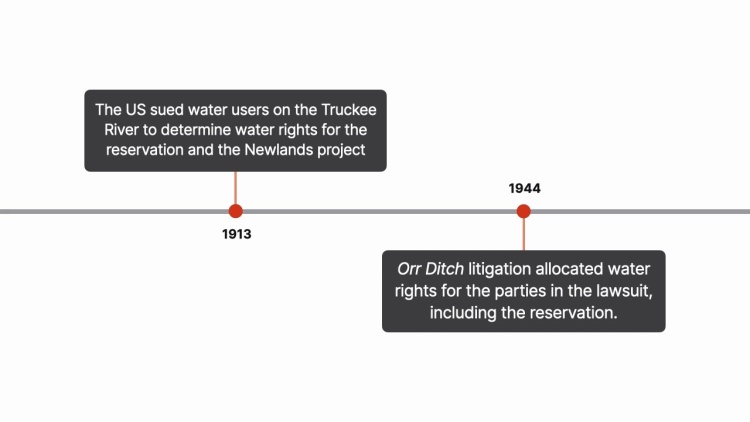Nevada v. United States
United States Supreme Court
463 U.S. 110, 103 S.Ct. 2906, 77 L.Ed.2d 509 (1983)
- Written by Lauren Groth, JD
Facts
In 1913, the United States initiated a lawsuit to determine water rights for users of the Truckee River. The United States sought reserved water rights for the Pyramid Lake Indian Reservation and the Newlands Reclamation Project, a federal project created under the Reclamation Act of 1902, 32 Stat. 388, with the intent of reclaiming and re-irrigating lands throughout the West. The defendants to the lawsuit included private landowners who also claimed rights to Truckee River water. As a result of this, which became known as the Orr Ditch litigation, which took almost 22 years to be resolved, water rights were allocated to the Pyramid Lake Indians for their reservation land, as well as to the lands held in the Newlands Reclamation Project. In 1973, the United States (plaintiffs) initiated a second action, seeking additional water rights in the Truckee River for the Pyramid Lake Indian Reservation. The United States argued that although the Orr Ditch litigation addressed the Reservation’s irrigation rights, the new litigation was meant to address its Indian inhabitants’ fishing rights. The defendants, including the State of Nevada (defendant), argued that the United States was precluded from relitigating its claim under the doctrine of res judicata. The United States District Court for the District of Nevada agreed and dismissed the complaint. The United States Supreme Court granted certiorari.
Rule of Law
Issue
Holding and Reasoning (Rehnquist, J.)
Concurrence (Brennan, J.)
What to do next…
Here's why 899,000 law students have relied on our case briefs:
- Written by law professors and practitioners, not other law students. 47,000 briefs, keyed to 994 casebooks. Top-notch customer support.
- The right amount of information, includes the facts, issues, rule of law, holding and reasoning, and any concurrences and dissents.
- Access in your classes, works on your mobile and tablet. Massive library of related video lessons and high quality multiple-choice questions.
- Easy to use, uniform format for every case brief. Written in plain English, not in legalese. Our briefs summarize and simplify; they don’t just repeat the court’s language.





